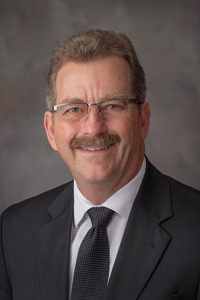Working group for county bridge match funds proposed
A new working group would award state matching funds to repair and replace county bridges under a proposal heard Feb. 5 by the Transportation and Telecommunications Committee.

The program, created by the Legislature in 2016 and administered by the state Department of Transportation, provides state funding to accelerate the repair and replacement of deficient bridges on the county road system. The state reimburses counties for 55% of a selected project’s construction costs, up to $250,000 per bridge.
The Legislature last session extended the program’s sunset date to 2029.
LB1030, introduced by Brainard Sen. Bruce Bostelman, would create the County Bridge Match Working Group, which would develop criteria for program participation, as well as for county matching fund requirements. It also would score applications and award funds.
Bostelman said a recent survey of county highway superintendents found that they want to be more involved in scoring applications.
“They believe having some county officials involved in the process would bring some clarity … while also giving the department a county official’s perspective when awarding the grants,” he said.
The governor would appoint two of the group’s members from a list of county highway superintendents, county surveyors or county engineers submitted by a statewide association representing county officials. The director of the department would select three department members to serve on the group.
LB1030 would require the state treasurer to make two $4 million transfers, one this fiscal year and another in 2025, from the Road Operations Cash Fund to the Transportation Infrastructure Bank Fund to be used for the County Bridge Match Program.
Khalil Jaber, deputy director of engineering for the state Department of Transportation, testified in support of the bill on the department’s behalf. He said the program so far has focused on replacing smaller bridges at the cost of a few hundred thousand dollars apiece.
As counties seek to replace larger spans, however, they may be unable to raise sufficient matching funds, requiring a reevaluation of the program’s criteria, Jaber said. The funding proposed under LB1030 could help replace up to a dozen of the larger structures annually, he said, although it would not be enough to meet all current needs.
Also in support was Lancaster County engineer Pam Dingman, who testified on behalf of her office, the Lancaster County Board of Commissioners and the Nebraska Association of County Officials.
She said county highway superintendents hope that the proposed working group will increase the County Bridge Match Program’s maximum rate of reimbursement to help cover inflation and the cost of building larger bridges. A 60-foot bridge recently opened in Lancaster County cost approximately $1 million, Dingman said.
“These bridges matter,” she said. “Placing funding into the program allows the citizens of Nebraska to get to school or work or to get their goods to market in a safe way on a reliable route.”
No one testified in opposition to LB1030 and the committee took no immediate action on it.


